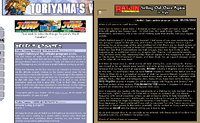Early Scanlation Dramalamacon

Early on, most groups existed in harmony with each other. The community was small, and staff members from different groups knew each other. Groups occasionally shared members and resources and collaborated on projects. Of course, there was also a fair amount of competition and drama.
Toriyama's World, being as big and popular as it was, inspired some fun debates. For example, when Viz started publishing Shonen Jump in the U.S., Toriyama's World partnered with Viz to promote the magazine and subsequently received a cut of the revenue through Viz's affiliate program. In the end, Toriyama's World signed up more subscribers for Viz than any other site. While some say Toriyama's World helped promote manga growth in the U.S., many scanlators weren't happy with the deal. They accused Toriyama's World of selling out and profiting from scanlation. Some groups, like Omanga and MangaScreener, put up free advertisements for the Raijin Comics magazine, one of Shonen Jump's competitors.
In the early days, rivalries usually formed out of ethical debates in response to a group's action or competition between groups scanlating the same manga. There was some fierce competition between Toriyama's World and MangaScreener, as both groups scanlated the same shounen series. As a result, MangaScreener gradually moved away from shounen scanlation and began scanlating manga aimed at more mature audiences.
MangaProject, being the other big group at the time, experienced problems of its own. At one point, so many leechers came to MangaProject's IRC channel asking for Toriyama's World releases that MangaProject's IRC operators started banning anyone who mentioned the name "Toriyama's World."
Rivalries arose between Toriyama's World and MangaScreener, MangaProject and Dual Translations, Toriyama's World and Omanga, and so on. During this period, most groups weren't concerned with the speed at which they released their works, so the competition mainly focused on who had the best quality.
But it wasn't all friendly competition; there were a fair share of controversy and drama as well. In 2002, there was a big fight between MangaScreener and Manga-Daisuki. The incident revolved around Manga-Daisuki's distributing of One Piece scanlations done by its sister group Null in which Null used MangaScreener head translator flyingrobots's translation of One Piece without permission. Of course, the dispute was eventually settled.
Although the legality of scanlation was already an issue at the time, many groups continued to scanlate, fueled by their love for manga and their desire to bring little-known series to an English-speaking audience. Scanlation was already sparking debates in 2001 and 2002, but it wasn't nearly as legally-questionable as it was in 2008 and 2009. Most groups were in good standing with publishers and dropped projects as soon as they were licensed, much to the dismay of leechers of course (like when Toriyama's World dropped Naruto after Viz licensed the manga in 2003). Many translators and editors that worked in the scanlation scene during this period would go on to work in the U.S. manga industry. In fact, one of Toriyama's World's translators actually worked for Tokyopop. Scanlation during this period was more novel, and some even thought of it as something artistic.
